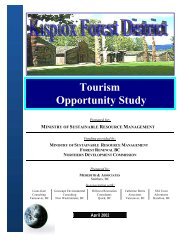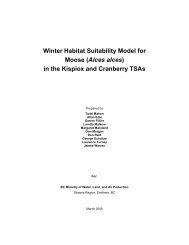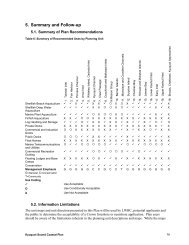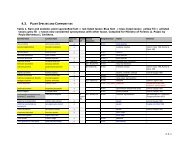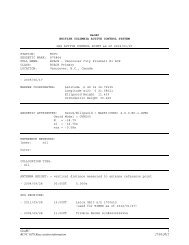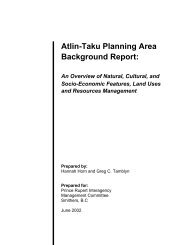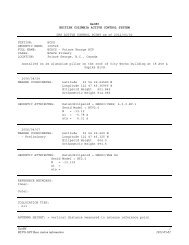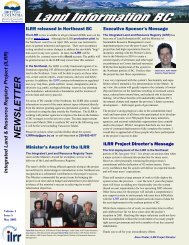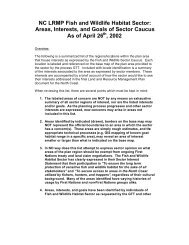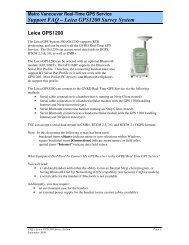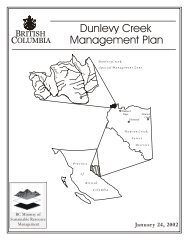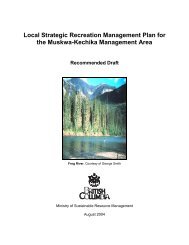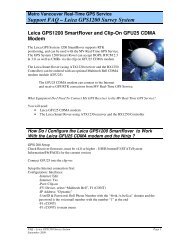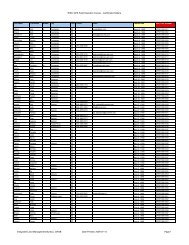Final report - Integrated Land Management Bureau
Final report - Integrated Land Management Bureau
Final report - Integrated Land Management Bureau
Create successful ePaper yourself
Turn your PDF publications into a flip-book with our unique Google optimized e-Paper software.
mobility, schooling and education, employment and income. The data were collected<br />
through a mail-out survey which was conducted from 2002 to 2004. Information was<br />
gathered on age, gender, length of time in community, First Nations membership,<br />
religious affiliation, how often respondents attend religious ceremonies, education level,<br />
income, sources of income, opinions about community, measures of sense of place, social<br />
capital and trust, social action, media use, and self-<strong>report</strong>ed health. The project has led to<br />
the development and testing of quantitative indices for measuring trust (generalized and<br />
institutional) as indicators of social capital, as well as measures of sense of place<br />
(commitment to place) in coastal B.C. communities. The research tested correlations<br />
between trust, social networks, and individual and community economic and social<br />
characteristics and commitment to place. The surveys included a series of questions for<br />
measuring trust that was developed into a scale and tested for reliability. The results of<br />
the research on social processes (social capital and commitment to place) conducted by<br />
UBC have informed the process of selecting indicators for social capital and sense of<br />
place for this project.<br />
4.2.3 Coastal Communities Project (CCP)<br />
A multi-year research project that replaced the Resilient Communities Project, the CCP is<br />
an initiative of the University of British Columbia and the Coastal Communities Network<br />
in partnership with coastal communities, including both First Nations and municipalities.<br />
One CCP project theme is “Community Health and Wellness” that aims to help coastal<br />
communities develop health services that reflect and respond to local conceptions of<br />
health and local needs.<br />
The project is based on the premise that good health and human well-being are linked<br />
with community resilience. The approach to health and well-being includes cultural,<br />
economic, social and environmental components. The research team is working with<br />
municipal and First Nation partners to develop monitoring tools to evaluate the impact of<br />
new health services approaches.<br />
4.2.4 B.C. Healthy Communities Project<br />
The B.C. Healthy Communities Project website features documentation and links to<br />
community indicators processes, such as the 2004 publication “Tools for Change” that<br />
describes over 40 community indicator projects in B.C. Published by the Social Planning<br />
and Research Council of B.C. (SPARC), the document outlines some 30 indicator<br />
processes, including local community indicator projects (such as the “Gulf Islands:<br />
Measuring Our Progress”), and 15 provincial initiatives such as the BC Socio-Economic<br />
Profiles of B.C. Stats Indices and “Measuring BC’s Performance – Toward Northstar<br />
2010 of the B.C. Progress Board.” The SPARC publication is available at<br />
http://www.sparc.bc.ca/resources_publications/resources_and_publications.<br />
20



